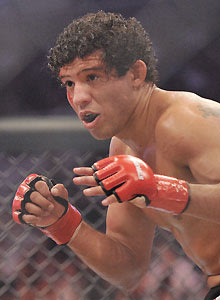Strikeforce is a business owned by Zuffa that is basically controlled by Showtime.
It makes as much sense as allowing men dismissed for poor performance by the Lingerie Football League to officiate NFL games. Sadly for those athletes who fight under the Strikeforce banner, that is the lot they have been given.
This arrangement isn't good for Zuffa. It's not good for Showtime. It's not doing much for mixed martial arts fans and it's certainly not good for Strikeforce-contracted fighters.
Everyone deserves better. What would be best for all would be an immediate divorce between Zuffa and Showtime. That would allow Zuffa to dissolve the Strikeforce brand and move its fighters to the UFC. It would allow Showtime to partner with a promoter more in line with its goals and strategies.
On Saturday, Showtime was scheduled to televise a card featuring a lightweight title fight between champion Gilbert Melendez and Pat Healy. Last week, Melendez injured a shoulder and had to pull out of the bout. Earlier this week, Showtime opted not to broadcast a re-jiggered card without Melendez. That prompted Zuffa to scrap the entire event.
"[Showtime holds] all the cards, right?" Zuffa CEO Lorenzo Fertitta said. "We were more than willing to go forward and do the event. They chose not to. Without television, we couldn't pull it off. It made no sense."
He didn't say it, but it is clear that without Melendez on the card, the event was going to be a financial loser. Strikeforce has plenty of good fighters, but few recognizable, marketable names. Without Melendez headlining the card to spur ticket sales, the show likely would have bombed at the gate.
The remainder of the fighters on the card, though, deserved better from Zuffa.
But they, along with Zuffa, deserve better than they're getting from Showtime.
[Related: Strikeforce fighters compensated after cancellation of card]
Through a spokesman, Showtime Sports executive vice president/general manager Stephen Espinoza declined to discuss with Yahoo! Sports the cancellation or anything to do with Strikeforce. Espinoza would have been made available for interviews to discuss boxing, however.
Showtime spokesman Chris DeBlasio said the network would let its statement speak for itself on the issue.
"Without our headline fighter and main event or a marquee undercard, we reluctantly informed Strikeforce that we could not continue with plans for the telecast," Showtime's statement read.
Zuffa had moved several of Strikeforce's top fighters, most notably Diaz, into the UFC in 2011, before an agreement between the sides stopped the exodus of talent to the larger, more high-profile organization.
It left Melendez as the face of Strikeforce and as Showtime's most promotable star, but it also left Melendez without the high-profile opponents needed to pull in big television ratings. Healy represented the kind of high-risk, low-reward opponent that is available to Melendez in Strikeforce.
Healy isn't particularly well known outside of the hard-core fan base, so a win over him wouldn't carry the significance for Melendez that, say, a win over UFC fighters Gray Maynard or Frankie Edgar would have. But Melendez knew full well that Healy was a legitimate threat who had the ability to take his title.
Many believe Melendez is the best 155-pound fighter in the world; he's one of the top 10 fighters pound-for-pound on pretty much everyone's list.
But the depth of challengers in Strikeforce, and their name recognition, isn't what it would be had he, like Nick Diaz, his Skrap Pack teammate, moved to the UFC.
When Zuffa purchased Strikeforce 18 months ago, it inherited the Showtime television contract, which is believed to expire sometime in 2013. Clearly, as it had done with every previous acquisition it had made, Zuffa planned to dissolve the Strikeforce brand and fold it into the UFC. That was the case with the Pride Fighting Championship, the World Fighting Alliance and World Extreme Cagefighting organizations.
Fertitta said Zuffa was sincerely interested in Strikeforce at the time of the deal and was excited by its prospects.
"We wanted to be in the space," Fertitta said. "We wanted to own the content. They had a nice [video] library. They had some fighters who we felt like could be interesting to bring over [to the UFC], like Nick Diaz and a couple of other guys. We were trying to make these fights that the fans wanted to see."
[Also: Chael Sonnen a no-show for barbecue with Anderson Silva]
The problem is, Showtime wanted many of the big names to stay in Strikeforce so they could appear on its air. At the time of the Strikeforce purchase, Zuffa was well down the road toward finalizing its landmark seven-year deal with Fox, in which UFC fights would only be broadcast on the Fox family of networks.
As a result, Zuffa had great incentive to push its talent to the UFC, while Showtime's incentive was to keep the majority of high-profile fighters in the Strikeforce stable.
The result has been a mess that benefits no one. Healy was frustrated because he was on the verge of a milestone in his career, getting to fight for the title. He went to Hawaii to train to prepare for Melendez, adding an additional $5,000 in expenses to his normal outlay.
Like most of the fighters, Healy doesn't understand the business nuances or competing interests. He simply wants to be able to fight on as big of a stage as possible and earn as much money as possible.
"I think Zuffa is behind us and they have our backs, and they seem like they're doing what they can to make this whole situation right," Healy said. "It's hard to say if we, as Strikeforce fighters, are valued as much as a guy in the UFC. I haven't been with them in the UFC, so I don't know.
"We just want to have more events and more opportunities to compete. It's very unfortunate. I thought the card was good enough to go on, and a lot of really good fighters aren't going to get to fight. But I'm just a fighter. I don't know why they did what they did."
Premium cable networks Showtime and HBO have great influence in boxing, because there is no other television entities willing to spend the money they do. But combined, HBO (approximately 29 million subscribers) and Showtime (approximately 21 million) are about half the size of FX, which does UFC cards, and Spike, which in 2013 will begin airing Bellator fights.
So, as a boxer, it's a big deal to fight on Showtime. In MMA, though, there is far less visibility fighting strictly on premium cable.
If Showtime parts ways with Zuffa, it could work with Spike and Bellator to broadcast its fights in a relationship where there would be plenty of synergy between the three.
There is no symbiosis, though, in the UFC-Strikeforce-Showtime relationship.
For the good of all concerned, it's time for the sides to part ways.
Other popular content on the Yahoo! network:
• Notre Dame exercises option to drop Michigan games from 2015-17
• Y! Shine: Victoria's Secret pulls 'racist' lingerie
• Chris Paul is convinced the Clippers have the secret to beating the Lakers
• Seattle-Green Bay controversy prompts massive change in payout, frustrates bettors






























